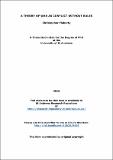Files in this item
A theory of war as conflict without rules
Item metadata
| dc.contributor.advisor | Rengger, N. J. (Nicholas J.) | |
| dc.contributor.author | Flaherty, Christopher | |
| dc.coverage.spatial | 220 p. | en_US |
| dc.date.accessioned | 2016-09-06T10:35:47Z | |
| dc.date.available | 2016-09-06T10:35:47Z | |
| dc.date.issued | 2017-06-19 | |
| dc.identifier | uk.bl.ethos.693141 | |
| dc.identifier.uri | https://hdl.handle.net/10023/9438 | |
| dc.description.abstract | Theoretical understandings of war have been dominated by the thought of Clausewitz for a number of decades. His thought is valid in many respects, but for various reasons it is open to misinterpretation and misunderstanding; furthermore, a number of his observations (particularly on the prevalence of chance and uncertainty in war) are not fully explored and substantiated theoretically. This thesis is an attempt to present and elucidate a new theoretical understanding of war’s nature which complements Clausewitz’s theories and addresses these concerns: this is the understanding of war as a form of violent conflict which is not bound by rules. The thesis consists of five main chapters. The first is an in-depth study of Clausewitz, which will provide an exegesis of his theories and highlight the deficiencies in his thought, before positing how understanding war as ‘violent conflict without rules’ could be used to address and explain them. The second chapter is a study of the theory of rules, examining in particular the role they play in moderating conflict: we can find that amongst other things, rules lend predictability and psychological security to a contest, restrict the scope of physical harm and tend to preserve the political and social status quo. As war lacks rules (in the sense that there are no ‘rules of war’ as there are ‘rules of chess’), it therefore lacks these benefits. A following chapter on the laws and customs of war will address cases where war appears to be bound by rules, and clarify my position. The final two chapters explore the implications of war’s lack of rules with reference to two areas which are most commonly associated with war. The fourth chapter on strategy will explore how this military concept is necessitated by war’s ruleless nature; the final chapter will examine the uniquely violent, physical nature of war through the same theoretical prism, and will show how the technological innovation associated with war is a consequence of its lack of regulation, and a potent contributor to the chance and uncertainty which plagues warfare. | en_US |
| dc.language.iso | en | en_US |
| dc.publisher | University of St Andrews | |
| dc.subject | War | en_US |
| dc.subject | Clausewitz | en_US |
| dc.subject | Rules | en_US |
| dc.subject | Theory | en_US |
| dc.subject | Strategy | en_US |
| dc.subject | Military technology | en_US |
| dc.subject | Law of war | en_US |
| dc.subject.lcc | U21.2F6 | |
| dc.subject.lcsh | War (Philosophy) | en_US |
| dc.subject.lcsh | Military art and science | en_US |
| dc.subject.lcsh | Strategy | en_US |
| dc.subject.lcsh | Clausewitz, Carl von, 1780-1831 | |
| dc.title | A theory of war as conflict without rules | en_US |
| dc.type | Thesis | en_US |
| dc.type.qualificationlevel | Doctoral | en_US |
| dc.type.qualificationname | PhD Doctor of Philosophy | en_US |
| dc.publisher.institution | The University of St Andrews | en_US |
This item appears in the following Collection(s)
Items in the St Andrews Research Repository are protected by copyright, with all rights reserved, unless otherwise indicated.

